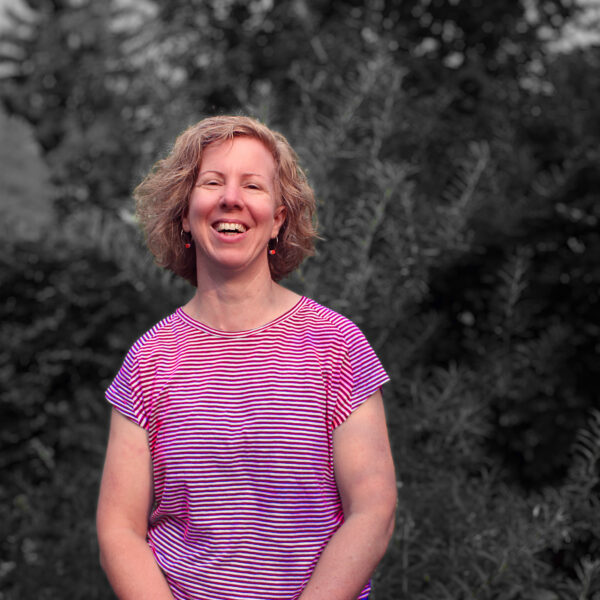Dr. Melanie Hoffman is running for Edmonton Public School Board (EPSB) Trustee to ensure every child can succeed, and families have safe, well-supported classrooms close to home.
A PhD chemist and longtime educator, Mel has led sustainability and education programs across Edmonton, and beyond. In collaboration with public and separate school divisions, Mel launched the EcoSchools Program in our region, helping schools use data to create healthy, inspiring learning environments, while supporting teachers and students to thrive.
Beyond the classroom, Mel has years of experience in community organizing and advocacy. She has co-chaired the City of Edmonton’s Energy Transition and Climate Resilience Advisory Committee, led province-wide grassroots campaigns, and trained dozens of volunteers to have vulnerable one-on-one conversations that bridge differences and build understanding. Her approach is rooted in listening first, finding common ground, and creating collaborative solutions that last.
At home in amiskwacî wâskahikan (the Cree name for Edmonton, meaning Beaver Hills House), Mel and her husband Sean are raising their daughter while contributing to strong neighbourhoods with vibrant public schools — the kind of schools every family deserves.
Statement of beliefs
Public education is the foundation of a healthy democracy and a thriving society. Done well, it nurtures children into thoughtful, capable, confident citizens while supporting families and communities to share in that growth. Every child deserves access to a safe, welcoming, and well-funded public school where diversity is valued and belonging is real. Education must be publicly funded and publicly accountable, with teachers and education workers respected and fairly compensated for their expertise. Public schools must foster equity, curiosity, and critical thinking, guided by Truth & Reconciliation, and inclusion of all identities and abilities. Private and charter schools should not receive public funds; our shared investment belongs in strengthening the system that serves all. Education must reflect the realities of the 21st century—advancing understanding of Indigenous rights, gender diversity, mental health, and our collective responsibility to one another. Collaboration is key for us to build communities where everyone can unfold their gift and contribute their full potential.
Priority areas
Space for kids to attend school close to their home and provide the support they need.
Inclusion: Welcoming full belonging for staff and students of abilities and identities.
Building resilience – climate justice in schools and classes to prepare students for the future.
Views on funding
In Alberta, we are proud of being a rich and resourceful province, and yet, our public education system has the third lowest per student funding across the country, and only PEI and SK teachers are lower paid, but have class size caps. This is shameful, and Albertans must work together to ensure our government supports schools to provide excellent learning environments. I do not believe that private education should receive any provincial funding. Public education is the education of all of us, and therefore, funding decisions should be made collaboratively. Teachers, students, and community members all have valuable insight into what is needed to best support public education. The school board is responsible for listening, distilling, and implementing this in a way that funding decisions serve all our students – especially the most vulnerable.
How learning conditions can be improved
Learning conditions in schools would be largely improved by funding smaller class sizes in accordance with the ACOL targets, to ensure students get the care and attention they need to thrive. Additionally, centering reconciliation will improve conditions for Indigenous and non-Indigenous students. In learning our true histories, students will grow into adults that are empathetic, critical thinkers. By incorporating traditional knowledge, like the medicine wheel, we centre the spiritual, emotional, mental, and physical wellbeing of students and teachers, making school a safer space for everyone. A move to more collaborative learning could be a long term way of improving learning conditions. This could happen by incorporating community involvement, connecting older and younger students, and changing the curriculum to focus more on relational learning over just learning content. This will set students up to become adults that will succeed in this world.
How trustees and school boards can best support teachers
First, trustees must listen to teachers. Teachers know what they need best, and by engaging with teachers directly, trustees can centre their advocacy on what is actually needed. From there, trustees must advocate with the province. While the current political environment makes this challenging, trustees must balance building strong relationships with provincial leaders and standing up for what teachers need. I believe that my experience on boards and in bridging division through curiosity-driven conversation sets me up to be effective in this role. Finally, trustees are policy makers. Using the information from teachers, input from the public, and evidence based research, trustees can create brave policies that are effective at addressing the multitude of challenges facing teachers and schools today. Of course, monitoring policy implementation and being adaptable in this time of change will be essential to make sure that teachers are supported in the way they need.
Views on the new K-6 curriculum
The new K-6 curriculum was not designed using the best available knowledge about childhood development and 21st century learning needs. The Government of Alberta (over multiple governments) engaged in a long, well-designed process of curriculum design that was thrown out and replaced by a curriculum that I understand is heavy on content, and does not provide students with the opportunities to develop higher order critical thinking skills, or the kind of information literacy that is needed today. I will support advocacy for curriculum changes that will give Albertans public education that meets the needs of the 21st century – curriculum that can be responsive to the advancements of AI, the recognition of climate and ecological crises, and provide students and families with tools to thrive as we collectively address rising social unrest.
This process must be guided by professionals – teachers, and education researchers, with student input.

